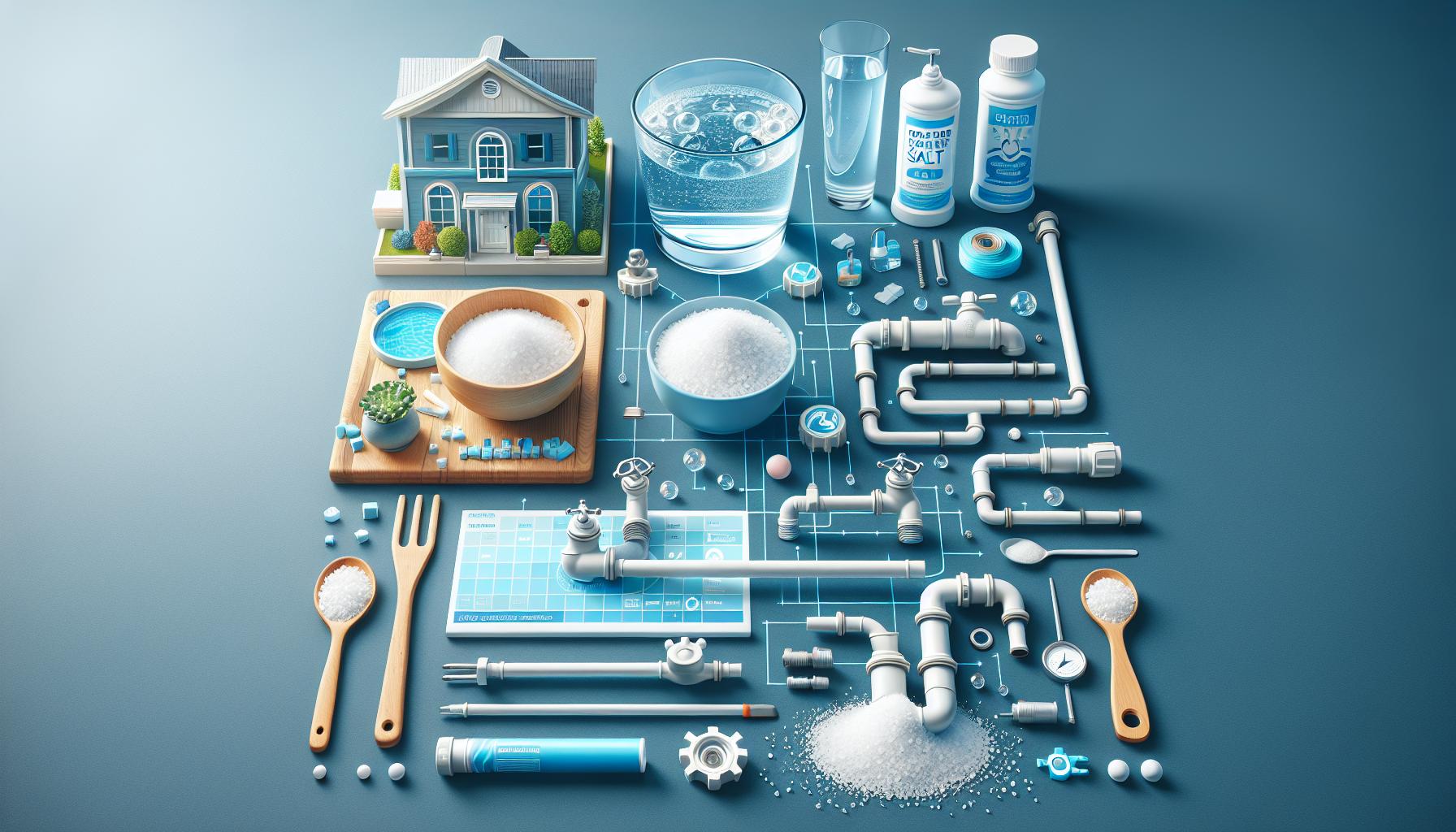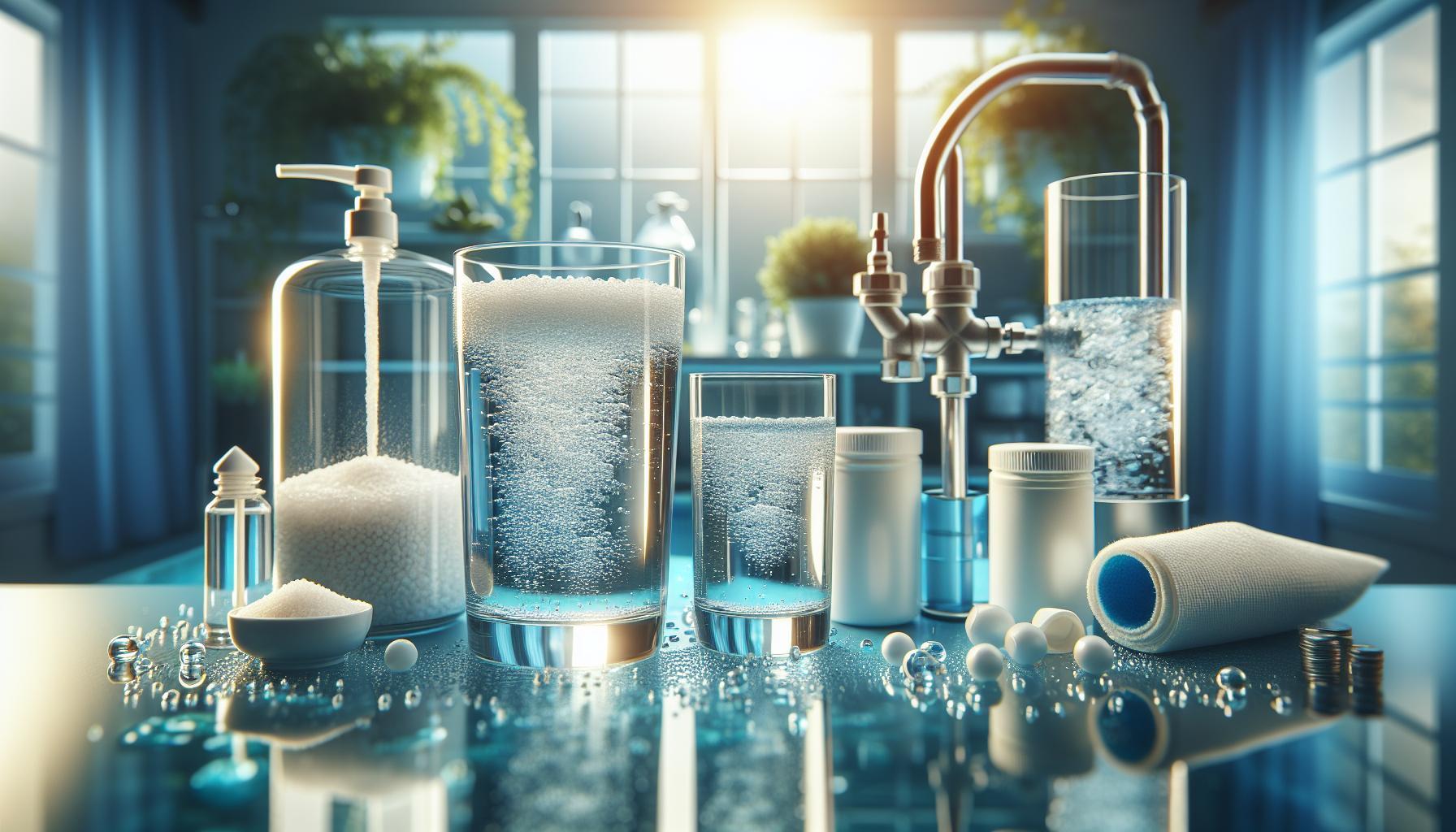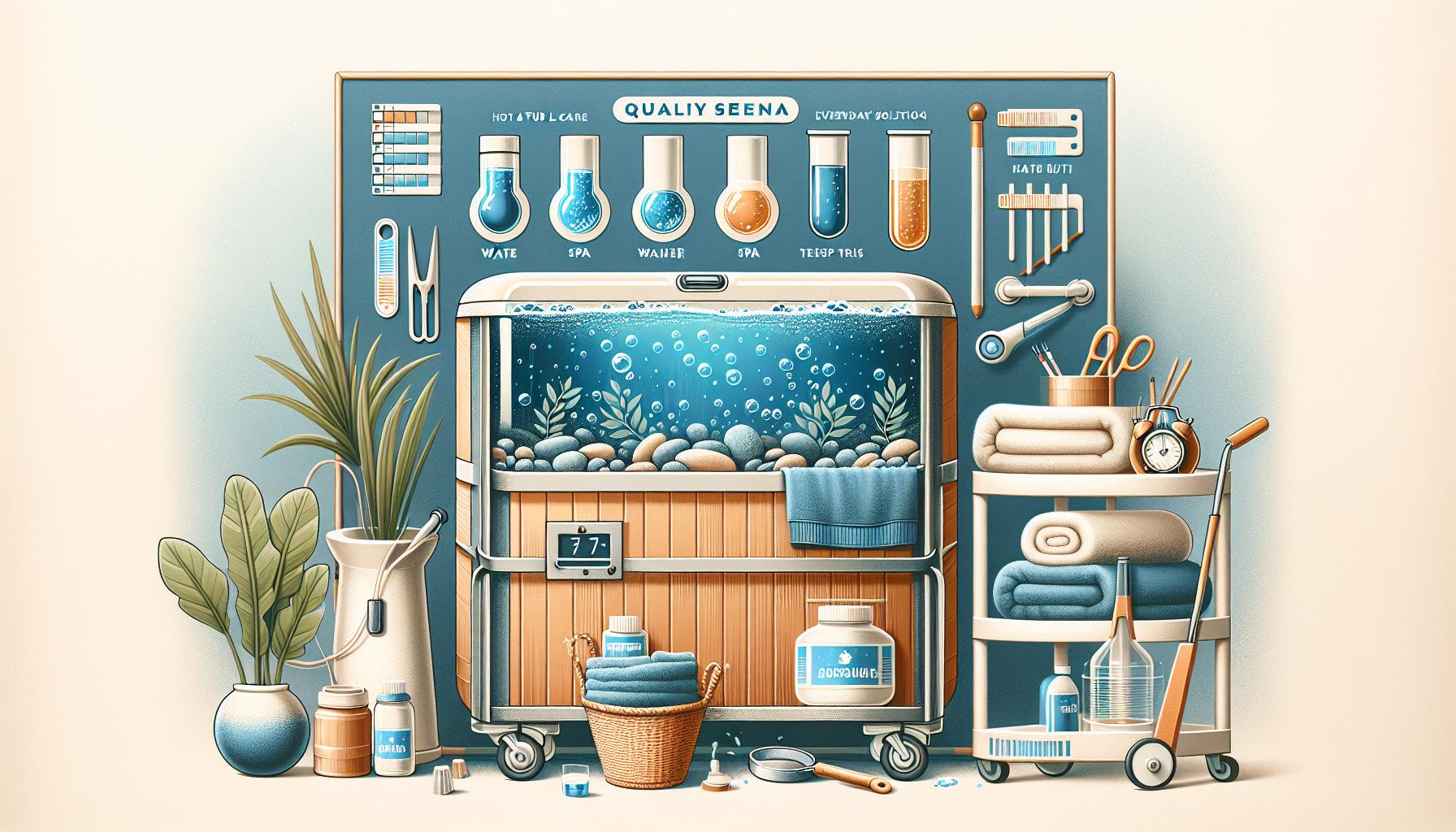As pool owners seek efficient maintenance solutions, a common question emerges: is it safe to use water softener salt in a swimming pool? Understanding the potential risks and benefits is crucial, as using the wrong type of salt can impact water chemistry and overall pool health. Dive into this article to discover expert recommendations and keep your pool sparkling clean.
Understanding Water Softener Salt: What You Need to Know
Water softener salt plays a crucial role in maintaining the efficiency of water softening systems, converting hard water into soft water by removing calcium and magnesium ions. However, its use is not limited to solely home plumbing systems—many pool owners wonder about the implications and potential risks of using water softener salt in their swimming pools.
When considering if water softener salt can be used in a pool, it’s essential to recognize that this type of salt typically contains additives that may not be suitable for swimming pool environments. For instance, some water softener salts include chemicals designed to prevent rust or buildup in household plumbing, which can negatively impact water clarity and the overall chemistry of pool water. Therefore, while water softener salt may appear to be a convenient option for pool salting needs, it often introduces unnecessary complications and chemical imbalances.
Risks of Using Water Softener Salt in Pools
- Chemical Additives: The inclusion of rust inhibitors and other chemicals can lead to unanticipated reactions with pool sanitizers, which could create cloudy water or promote algae growth.
- Water Balance Issues: Water softener salt might alter the pH and alkalinity of pool water, making it more difficult to maintain proper balance.
- Corrosive Properties: Some formulations may be corrosive to pool fixtures and equipment, leading to costly repairs.
If you’re seeking alternatives for salting your pool, it’s wise to opt for pool-grade salt, which is specifically designed for use in swimming pools. This type of salt is typically free from chemicals or additives that could interfere with pool maintenance and water quality.
Practical Recommendations
To maintain optimal pool health and safety, adhere to these practical steps:
- Always check the product label before adding any salt to your pool.
- Consider investing in pool-grade salt that is designed for your pool’s needs, ensuring it is free of additives.
- Regularly test the water chemistry before and after adding any type of salt to monitor any changes.
In summary, while the lure of using water softener salt in your pool may seem appealing, understanding the risks involved is vital. Stick to formulated pool salts to safeguard your swimming environment and prolong the life of your pool system. Choosing the right product ensures you enjoy a clean, safe, and enjoyable swimming experience.
The Difference Between Pool Salt and Water Softener Salt
Understanding the distinction between pool salt and water softener salt is essential for pool maintenance, especially for those considering alternatives for their saltwater systems. While both types of salt share a common chemical composition—sodium chloride—they are formulated for different purposes and can have vastly different effects when used incorrectly.
Composition and Purity
Pool salt, specifically designed for saltwater pools, is typically food-grade quality and largely pure, as it needs to be safe for both the water and swimmers. The purity of pool salt is critical because impurities can lead to cloudiness in the water and can interfere with the chlorine generation process, which is essential for keeping the pool sanitized. In contrast, water softener salt can vary significantly in purity and may contain additives or impurities that could harm pool equipment and affect water quality.
Usage and Recommendation
Using water softener salt in a pool may present various risks that pool owners should be aware of:
- Potential Impurities: Many brands of water softener salt can contain anti-caking agents and other additives that are not suitable for swimming pool use.
- Chlorine Generation Inefficiency: A pool salt’s primary function is to help with chlorine generation; using the wrong type may hinder this process, leading to poor water sanitation.
- Corrosion Risks: Some compounds in water softener salt could corrode pool equipment and surfaces over time.
Informally, the general consensus among pool maintenance experts is that it’s not advisable to substitute water softener salt in place of pool salt. As noted in the guide on whether water softener salt can be used in a pool, while the chemistry may be similar at a basic level, the specific applications and formulations are crucial for maintaining optimal pool conditions and protecting your investment.
Conclusion
In summary, while both pool salt and water softener salt are based on sodium chloride, their differences in purity, function, and safety make them suited for entirely different applications. Whether managing water hardness in household systems or maintaining pool water clarity and safety, adhering to the right products will ensure a pleasant swimming experience while preserving the longevity of your pool setup. Always prioritize using the recommended salt types for their specific applications to avoid costly mistakes and health risks.
Potential Risks of Using Water Softener Salt in Your Pool
Using water softener salt in swimming pools has garnered attention for its potential ease of use and convenience. However, before you make the decision to add this product to your pool, it’s essential to consider the potential risks that could arise. Improper use of water softener salt in a swimming pool can lead to several unintended consequences, affecting both the water quality and the overall pool infrastructure.
Possible Chemical Imbalances
One significant concern when incorporating water softener salt into pool water is the risk of chemical imbalances. Water softeners typically contain sodium chloride, which can alter the chemistry of your pool water. Here’s what can happen:
- Higher sodium levels may interfere with the pool’s overall salinity, complicating the balancing of other chemicals.
- The altered salinity can affect chlorine levels, leading to inadequate sanitization and increased risk of algae or bacteria growth.
- Over time, this imbalance can impact the pH levels, making it harder to maintain the ideal range (7.2 to 7.8), which is crucial for swimmer comfort and equipment longevity.
Equipment Damage
Another concern is the potential for corrosive effects on pool equipment. The reaction between water softener salt and pool materials can lead to deterioration, particularly in areas with metal fixtures. Here’s how:
- Salt can be especially harmful to pumps and heaters, leading to premature failures and costly repairs.
- Pool liners and tiles may also be affected, causing fading or degradation if exposed to high saline concentrations consistently.
- Components such as ladders and railings may corrode faster, necessitating replacement sooner than expected.
Health Implications
Lastly, there are health implications worth noting when evaluating whether to pose the question, “Can water softener salt be used in a pool?” The introduction of additional sodium into the water can pose risks for certain individuals:
- People with sodium sensitivity may react adversely to the elevated salt levels.
- High sodium concentrations can lead to skin irritation or exacerbate conditions like eczema or psoriasis for sensitive swimmers.
| Risk Factor | Implications |
|---|---|
| Chemical Imbalance | Inadequate sanitation, increased algae/bacteria |
| Equipment Damage | Corrosion, premature hardware failure |
| Health Risks | Skin irritations, adverse reactions for sensitive individuals |
In summary, while the idea of using water softener salt in your pool might seem attractive for its potential benefits, it’s crucial to weigh the risks carefully. Understanding these potential hazards can inform your decision and help maintain a safe and enjoyable swimming environment.
Recommended Alternatives for Pool Salination
When considering options for maintaining balanced salinity levels in pools, one might wonder about the appropriateness of using water softener salt. However, the risks associated with this choice—ranging from improper chemical composition to potential damage to pool equipment—point towards exploring safer alternatives. Investing a little time in understanding the right salination methods can elevate your pool experience while ensuring the longevity of its components.
Safe Alternatives for Pool Salination
Instead of water softener salt, pool owners should consider using products designed specifically for pools. These alternatives offer the right concentration of sodium chloride without the unwanted impurities that can come with water softener variants. Here are some noteworthy options:
- Pool-Grade Sodium Chloride: This is the most recommended option for salting pools, as it’s formulated specifically for pool use, ensuring proper dissolution and minimal cloudiness.
- Solar Salt: Ideal for those looking for a natural option, solar salt is harvested through the evaporation of seawater, making it a more environmentally friendly choice. Make sure to verify that it’s pure enough for pool use.
- Food-Grade Salt: Though more expensive, food-grade salt has the highest purity levels, ensuring no contaminants are introduced. It works effectively in saltwater pools with the right salinity levels.
Avoiding Risks While Switching to Alternatives
When deciding on a new salination method, it’s essential to keep potential pitfalls in mind. Below is a comparison table highlighting key factors to consider before making a switch:
| Salt Type | Purity Level | Cost | Compatibility with Pools |
|---|---|---|---|
| Pool-Grade Sodium Chloride | High | Moderate | Optimal |
| Solar Salt | Moderate to High | Low | Suitable |
| Food-Grade Salt | Very High | High | Ideal |
Each alternative comes with its own set of advantages, so take the time to evaluate what aligns best with your pool maintenance regimen. By committing to using appropriate materials for salination, you can maintain clean water without compromising safety or effectiveness.
How to Safely Maintain Your Pool’s Water Quality
Keeping your pool water clean and safe is essential not just for aesthetics but also for your health. Harmful bacteria and algae can proliferate in unbalanced water, leading to unpleasant swimming experiences and potential health risks. Understanding the proper way to maintain your pool’s water quality is crucial, especially when considering factors such as the use of alternative substances like water softener salt.
Understanding Water Balance
Maintaining the right chemical balance in your pool starts with understanding its core components. Regular testing of pH, alkalinity, and sanitizer levels will ensure that your pool remains a healthy oasis. Here’s a breakdown of what to monitor:
- pH Level: Aim for a pH between 7.2 and 7.8. An unbalanced pH can irritate skin and eyes, and reduce the effectiveness of chlorine.
- Alkalinity: Total alkalinity should range from 80 to 120 ppm. Proper alkalinity helps stabilize pH levels.
- Chlorine Levels: Maintain chlorine levels between 1 and 3 ppm to effectively sanitize the water.
Regular testing can prevent common pool issues such as cloudy water or unpleasant odors, which can occur when chemicals are unbalanced or inappropriate substances, like water softener salt, are used.
Cleaning and Sanitizing
Regular cleaning and sanitization of your pool will go a long way in maintaining its water quality. Here are some key practices to implement:
- Skim the Surface: Remove leaves and debris daily using a skimmer net to prevent organic matter from decomposing in the water.
- Brush the Walls: Brush the walls and floor of your pool weekly to prevent algae buildup.
- Vacuuming: Utilize a pool vacuum to remove dirt and debris from the bottom of the pool regularly.
- Shock Your Pool: Shock treatment can be utilized after heavy rains or high swimmer loads to reset the pool’s sanitizer levels.
These actions not only keep your pool looking pristine but also ensure it remains safe for everyone to enjoy.
Evaluating Alternative Salt Sources
While some homeowners may wonder, “Can water softener salt be used in a pool?” it’s crucial to understand the risks involved. Water softener salt often contains additives like sodium and other chemicals that can disrupt pool chemistry and cause corrosion to your pool equipment. Instead, consider these safer alternatives for managing salinity and overall water quality:
| Alternative Salt Options | Benefits |
|---|---|
| Pool-Safe Salt | Specifically formulated for pools, ensuring compatibility with salt chlorine generators. |
| Mineral-Based Products | Help reduce chlorine levels and improve water clarity without harming equipment. |
By opting for products designed specifically for swimming pools, you can maintain optimal water quality while avoiding the complications associated with using water softener salt.
Maintaining your pool’s water requires diligence, the right tools, and knowledge of what additives are suitable. By adhering to best practices in water balance, regular cleaning, and choosing appropriate salt sources, you’ll ensure your pool remains a safe and refreshing retreat for family and friends.
Professional Insights: Expert Opinions on Salt Selection
Understanding which type of salt to use can make a significant difference in the health and clarity of your pool water. While many pool owners may wonder, “Can water softener salt be used in a pool?” the answer is not so straightforward. Expert opinions in the field emphasize the importance of choosing the right salt types to maintain a pool’s ecosystem and prevent potential problems.
Expert Views on Salt Types
Experts agree that not all salts are created equal. When it comes to salt for pool systems, particularly those using saltwater chlorination, the following points are crucial:
- Purity is Key: Standard water softener salt often contains impurities, such as calcium and magnesium. These additional minerals can lead to cloudy water and scale buildup, which can damage your pool equipment.
- Intended Use Matters: Pool-grade salt is specifically manufactured to dissolve evenly and consistently, ensuring a stable salinity level conducive to proper chlorination. In contrast, water softener salt may not dissolve completely, leading to uneven distribution and potential hotspots of high salinity.
- Risk of Algae Growth: The introduction of impurities from water softener salt may increase the risk of algae blooms, which can be costly and labor-intensive to manage. A balanced salt system is essential for inhibiting unwanted growth.
Moreover, professionals often highlight the long-term costs associated with using inappropriate salt. While using water softener salt might seem like a cost-effective solution initially, the potential for scale buildup and water issues can lead to higher maintenance, chemical treatments, and even repairs in the long run.
Recommendations from Professionals
Those in the pool maintenance industry recommend a few actionable steps to ensure optimal salt selection:
- Always opt for pool salt: Use high-purity salt designed specifically for pools. This choice guarantees the absence of additives that could cause issues in your water.
- Check for compatibility: If you are switching from water softener salt to pool salt, consult your pool system’s manual to ensure compatibility and make adjustments to your chlorination settings as needed.
- Educate yourself: Familiarize yourself with your pool’s needs, including the recommended salinity levels, to prevent overuse or misuse of any salt type.
By adhering to these guidelines from professionals, pool owners can not only avoid the risks associated with using water softener salt in their pools but also ensure that their aquatic environment remains healthy, clean, and enjoyable for all users.
Tips for Proper Pool Maintenance Beyond Just Salt
To maintain a clean and inviting pool environment that goes beyond merely adding salt, adopting a comprehensive maintenance routine is crucial. Regular upkeep not only enhances water clarity but also ensures that your pool equipment functions efficiently, reducing the need for costly repairs. From monitoring chemical levels to routine cleaning, these steps are vital for pool health and safety.
Routine Chemical Testing
Regularly testing your pool’s water chemistry is essential. This involves checking the pH, chlorine levels, alkalinity, and calcium hardness. Maintaining proper chemical balances not only enhances swimmer comfort but also prevents algae growth and scaling. A good rule of thumb is to test your pool water at least twice a week during peak season.
- pH Levels: Aim for a pH range of 7.2 to 7.6.
- Chlorine Levels: Keep free chlorine between 1-3 ppm.
- Alkalinity: Should be maintained between 80-120 ppm.
- Calcium Hardness: Ideal range is 200-400 ppm.
Effective Cleaning Practices
Skimming debris from the surface of the water, brushing walls and tiles, and vacuuming the pool floor are crucial tasks to undertake. Debris left in the pool can lead to algae blooms and can make the pool look uninviting. Aim to perform skimming daily and deep clean the pool weekly.
| Cleaning Task | Frequency |
|---|---|
| Skim Surface Debris | Daily |
| Brush Walls & Tiles | Weekly |
| Vacuum Pool Floor | Weekly |
| Check & Clean Filter | Monthly |
Equipment Check and Maintenance
Checking the functionality of your pool equipment is an often-overlooked aspect of pool care. Regularly inspect the pump, filter, and any automated systems you may have. Make sure to clean or replace filter cartridges as needed, and always consult the manufacturer’s instructions for specific maintenance guidelines. Keeping equipment in optimal condition not only saves money in the long run but also ensures a safer swimming environment.
In summary, while you may wonder, “Can water softener salt be used in a pool? Risks and recommendations,” the key to a healthy pool lies in more than just salt. Emphasizing consistent chemical testing, thorough cleaning, and regular equipment checks creates a robust framework for enjoying crystal-clear waters all season long. This proactive approach will help you maximize your time lounging by the pool rather than worrying about maintenance issues.
FAQ
Can Water Softener Salt Be Used in a Pool? Risks and Recommendations?
No, water softener salt should not be used in a pool as it can disrupt the pool’s chemical balance and lead to several issues. Traditional water softener salt contains additives that are not safe for swimming environments.
Using water softener salt in a pool may result in cloudy water and affect the effectiveness of chlorine and other sanitizers. Additionally, it can create imbalances that might cause scaling or corrosion in pool equipment, which is costly to repair.
What are the alternatives to water softener salt for pool maintenance?
Instead of water softener salt, consider using chlorine or bromine-based sanitizers specifically designed for pools. These alternatives effectively maintain clean and safe swimming conditions without the risks associated with softener salt.
Additionally, regular testing of water chemistry using kits can help ensure that your pool remains balanced. Look for products labeled as safe for use in swimming pools to avoid damaging effects.
Why does using water softener salt in a pool cause problems?
Water softener salt can cause several issues, including disruption of pH levels and increased salinity in the pool water. This can lead to cloudy water and reduced effectiveness of sanitizers.
Increased salt levels can also corrode pool surfaces and equipment, creating more significant maintenance problems and potential health hazards for swimmers.
Can I use water conditioner products in my pool?
No, using water conditioner products, which are intended for treating hard water, is not advisable in pools as they may alter the water balance negatively.
Swimming pool maintenance products are formulated specifically for that environment. It’s essential to use approved chemicals that help to maintain the pool’s sanitation and clarity without causing harmful effects.
What are the signs of using the wrong salt in a pool?
If the wrong salt is used in a pool, you might notice discoloration of water, cloudiness, and irritation to skin and eyes.
Other common signs include scaling on pool walls and equipment, along with poor sanitizer effectiveness. If you observe these signs, it may be necessary to test the water and adjust its balance.
How can I safely manage pool chemistry?
To safely manage pool chemistry, regularly test the pool water using test strips or kits designed for this purpose. This will help monitor pH, chlorine levels, and overall balance.
Adjust chemicals gradually and consult local pool supply stores for guidance on specific brands and products tailored for your pool type. Maintaining the right balance not only ensures safety for swimmers but also prolongs the life of your pool.
Why is maintaining correct salt levels important in pool water?
Maintaining proper salt levels in pool water is crucial to ensure the effectiveness of chlorine generators and to prevent corrosion of pool systems.
Imbalanced salt levels can also lead to uncomfortable swim conditions for users and increase maintenance costs over time. Keeping a close eye on water chemistry is essential for a safe swimming experience.
The Way Forward
In summary, while water softener salt can technically be used in a pool, it comes with certain risks and may not be the best choice for maintaining your pool’s health and clarity. The potential for increased sodium levels and reduced effectiveness of pool chemicals are notable concerns. Instead, consider using pool-specific salts that are designed to support your water system without compromising its balance.
We encourage you to explore further the various options available for pool maintenance, ensuring a safe and enjoyable swimming environment for you and your family. Whether you choose to consult with a professional or delve into reliable resources, knowledge is key to not only solving but also preventing water-related issues. With the right information and approach, you can confidently tackle any water challenge that comes your way. Happy swimming!






